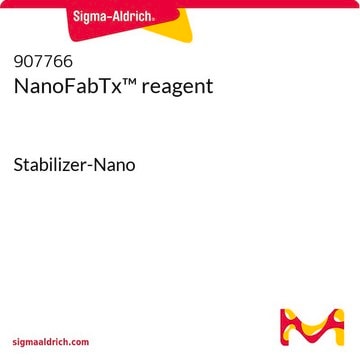918881
NanoFabTx™ PEG-PCL drug formulation screening kit
for synthesis of PEGylated nanoparticles
Sinónimos:
Drug delivery reagent kit, NanoFabTx reagent kit, Nanoparticle synthesis kit, PEG-PCL
About This Item
Productos recomendados
descripción
Drug loading screening kit, for synthesis of PEGylated PCL nanoparticles
Kit components :
PEGPCL-L(915203-500mg)
PEGPCL-H(912549-500mg)
PEGPCL-UH (917788-500mg)
Stabilizer-Nano (907766-5g)
Nivel de calidad
aplicaciones
advanced drug delivery
temp. de almacenamiento
2-8°C
Categorías relacionadas
Descripción general
- A Nanoprecipitation protocol to prepare drug-encapsulated nanoparticles in standard laboratory glassware.
- A Microfluidics protocol using commercial platforms or syringe pumps.
Aplicación
Características y beneficios
- Ready-to-use nanoformulation kit for PEGylated PCL nanoparticles
- Choose from either nanoprecipitation or microfluidics-based protocols
- Create specifically sized, biodegradable, PEGylated PCL nanoparticles
- Maximize the encapsulation of hydrophobic drugs
- Three different PEGylated PCLs are included
Información legal
Producto relacionado
Código de clase de almacenamiento
10 - Combustible liquids
Certificados de análisis (COA)
Busque Certificados de análisis (COA) introduciendo el número de lote del producto. Los números de lote se encuentran en la etiqueta del producto después de las palabras «Lot» o «Batch»
¿Ya tiene este producto?
Encuentre la documentación para los productos que ha comprado recientemente en la Biblioteca de documentos.
Artículos
NanoFabTx™ platform accelerates drug development with ready-to-use formulations and microfluidic devices for particle synthesis.
NanoFabTX kits enable precise drug delivery with lipid nanoparticles and liposomes for mRNA and nucleic acids.
Professor Robert K. Prud’homme introduces flash nanoprecipitation (FNP) for nanoparticle fabrication, which is a scalable, rapid mixing process for nanoparticle formulations.
Nuestro equipo de científicos tiene experiencia en todas las áreas de investigación: Ciencias de la vida, Ciencia de los materiales, Síntesis química, Cromatografía, Analítica y muchas otras.
Póngase en contacto con el Servicio técnico







